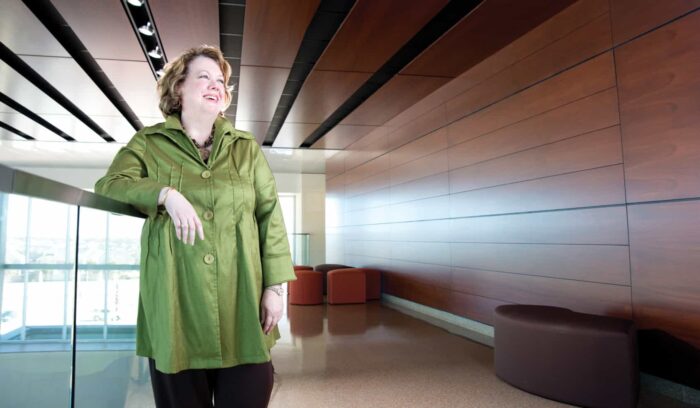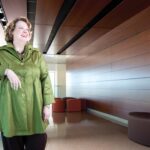Legacy of Education

A Professor’s Influence, A Parent’s Love
Dr. Debra Nelson is a powerhouse. After a superlative career in education with roles as a teacher, principal, and the upper echelon of administration, she is now the Deputy Superintendent of Curriculum Development for the rapidly-growing Frisco Independent School District. But Debra Nelson's career is not the whole story—impressive as it is. Her love of education and her rise through its ranks are attributable, in part, to a family legacy and love of education fostered by her father, former department head and Professor Emeritus, M.B. Nelson. M.B. Nelson and his wife Netty first raised their daughters in Bonham, Texas while he worked as superintendent for Bonham ISD. When his older daughter,
Pam, graduated from high school, the family moved to Commerce where Nelson joined the faculty of the Educational Administration department of East Texas State University. After moving to Commerce, Debra Nelson discovered that she was inextricably tied to the university through the Commerce community. She attended classes at Commerce High School with other professors' children, she had community members and university dignitaries in her home consistently, and those relationships were tightly woven together.
“I knew lots of the university people because I either was in school with their kids or they were friends of my parents or they went to church with us,” she said “That's the piece that I hold so fondly in my memory about the university and the town. And it's hard for me to separate the university and the town. I straddled both of those because of my father and our allegiance to the university. I hold so many fond memories of the relationships.”
After graduating high school, Nelson made the transition to Stephen F. Austen State University in Nacogdoches, but it was not meant to be. She transferred back to East Texas State University the following year and fell into step beside former school classmates and peers, as well as familiar professors and family friends. She changed her major several times as an undergraduate, as so many students do, but when she took an education course from Dr. Barbara Hammack, she knew she was home.
“Like many young, foolish people, I always said I would never be a teacher because I was reared in that. But my father wisely said to do whatever made me happy. So he never encouraged me either way,” Nelson said. “When I took an education class with Dr. Hammack, who's still there, I knew it was the niche for me.”
After graduation from the bachelor's degree program, Debra Nelson taught first grade in Commerce and decided to continue her education by pursuing a master's degree; however, one of the greatest drawbacks to going further in educational administration was the thought of sitting in her father's classes.
“So many times I would go to the back of the room and sit in the corner, and he would call on me like he would every student. And I studied harder for that class and for those tests because, one, I didn't want to embarrass him and, two, I didn't want people to ever perceive that he was easier on me.”
Upon completion of her master's degree, Nelson was accepted to Baylor University and the University of North Texas for her doctoral work. At the time, East Texas State University's program in educational administration was one of the most celebrated in the state, and she struggled with the idea that she might suffer from a stigma by completing all three of her degrees from one institution if she stayed at ET. After weighing her options carefully and seeking her father's advice, Debra Nelson decided to pursue her doctorate from East Texas State University for its quality and superb reputation, a decision that has served her well throughout her career.
“My father had, at one time, more practicing administrators in the state than any other professor in Texas because ET was producing so many administrators, and they were so highly regarded,” Nelson said. “It always amazed me. I would hear about people flying in from the Valley, Arkansas, or Oklahoma. They would fly into Dallas, pick up a rental car after they'd taught or been a principal or superintendent all week. On Friday night they would take a course or do research in the library. They would take a couple of classes on Saturday, do research in the library again on Saturday night, and then fly home so they could go to work on Monday.”
The decision to complete an Ed.D. at East Texas State University also provided her with one of the most cherished moments of her life and one of her most cherished moments with her father.
“I had hoped that he would be allowed to award my doctoral hood at graduation. But they normally don't allow any substitutions other than the President or Dean. But I asked him and he said, ‘Honey, I just don't think it's going to happen.' Dr. Charles Austin was President at the time and unbeknownst to me, Dad had already made that request and it was granted.”
While President Austin actually handed Debra Nelson her diploma, her father was allowed to award her doctoral hood in a moment charged with emotion and a sense of overcoming great odds.
“I have a picture of that moment in my office, and it's very dear to me. I wanted to give up several times, thought I wasn't smart enough or bright enough to do this, and was intimidated by others in my classes because I was so young. In my dad's soft way, he kept guiding me without telling me what to do.”
While M.B. Nelson passed away at the age of 78, Debra Nelson has a treasury of magnificent, heartfelt memories of her father that she carries with her through the quiet, personal moments and into her daily workplace. M.B. Nelson was undoubtedly one of the greatest influences in Debra Nelson's life, and the lives of many others in the education community across the state.
“It made a difference that he always said, ‘I'm proud of you. Do what you want to do,' and that's what an educator does. I'm doubly blessed because he was my father as well. But I saw him do that for people he wasn't related to. That's what people would tell you about M.B. Nelson, ‘He was a kind, caring person. He cared about me and my family and me as an individual and he wanted the best for me.' If his legacy can live on through me, I'm blessed to carry that. He impacted me as a human being, certainly, but as an educator as well.”



